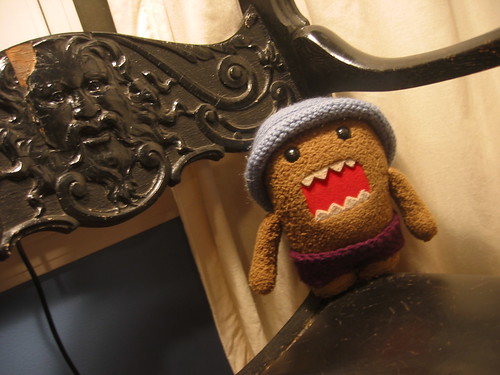
{Domo-kun is not a yakuza. He's far too kawaii for that. Photo by rocketlass.}
On the recommendation of the ever-reliable Sarah Weinman, last weekend I read Jake Adelstein's new book, Tokyo Vice: An American Reporter on the Police Beat in Japan (2009). It's got pretty much everything you want in true crime: danger; drama; appalling behavior; and a narrator who is easily obsessed, heedless of his own health and well-being, and prone to dangerous ethical compromises.
Adelstein, an American who went to college in Japan and stayed there as a reporter on the Yomiuri Shinbun, a prominent Japanese-language newspaper, offers a fascinating account of the seamier side of Japanese life. One great strength of the book is Adelstein's odd position: while he dives fully into the punishing three-deadlines-a-day, drinks-after-work, never-take-a-vacation life of a Japanese reporter, and thus comes as close as seems possible to being a part of and understanding this segment of Japanese life, at the same time he can't help but remain an outsider--which enables him to understand just which parts of Japan's treatment of issues of sex, gender, power, and crime will perplex, shock, or horrify American readers.
One of the least sordid, yet nonetheless most surprising aspects of the book for me was its depiction of the relationship between crime reporters and the police they cover. In order to cultivate police sources, reporters are expected to routinely visit cops at home--and bring gifts! Adelstein quotes at length from a memo one of his supervisors once sent to the paper's police reporters:
It's really sad that I have to write the ABCs of being a police reporter down for your losers. . . . If you just aimlessly visit cops at their homes during the evening, you won't get them to say anything. Anybody can get the addresses of detectives from their senpai [senior reporters] and go to the house, wait a couple of hours, and then, when they come home, butter them up and occasionally prime the pump with tickets to a Giants baseball game. . . . What are you doing to distinguish yourself from other reporters? Take a moment to reflect on your efforts.What I find most stunning about this approach isn't the ethical questions it raises for both sides, or the demands it places on the reporter's time: it's the idea that the police would welcome it. It just seems insane that a cop, home from a long day at work, would want a relative stranger showing up at the house for a chat, no matter what gifts he might be bearing.
Do you take care of the cop you want to crack? . . . Do you ask the cops to get food or something to drink with you? Do you make efforts to get the police to ride in the hired limousine with you? On a rainy day or when the snow falls, this is the perfect opportunity to send them from their house to the train station or vice versa.
Do you randomly visit cops in the morning? . . . If one of your cop buddies is sick, do you take the time to visit him in the afternoon? If you just go visit him in the evening, that's about the level of a first-year reporter for Yamagata [Hicksville] Television. If the wife or kids of the cops have a cold, buy some cold medicine, some orane juice, and take it to the house. . . .
Hanging out with your family and their family at the same time is the ultimate way to cultivate a source. Families that play together, stay together.
Have you ever taken your wife and kids with you on a Saturday and just stopped by "because you were in the neighborhood?"
Clearly, between my preference for regular hours and for privacy in my home, I ought not to think of going into either reporting or policing in Japan. Which, given that my Japanese extends only so far as to apologize for my lack of Japanese, is probably for the best anyway.
Levi-san,
ReplyDeleteJust a note to say I really enjoyed the three part series you did on the book and of course, Domo-kun pictures. He's a cute little monster.
You picked up on and introduced parts of the book that I myself am particularly fond of and bring back good memories.
I had dinner with Detective Sekiguchi's family last Sunday, and it's great to see that his daughters are as cheerful, energetic and as happy as they were when they were kids.
Thanks, Jake--as I hope you can tell from my posts, I really enjoyed the book and learned a lot. Now I feel like I have a much better understanding of what was going on behind the garish seediness we passed through in Shinjuku on our way to the quieter confines of the Golden Gai.
ReplyDeleteAnd I'm glad to hear that Detective Sekiguchi's family is doing well. He came across as quite an impressive person.